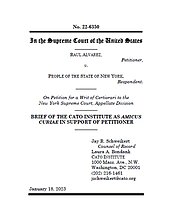Learn more about Cato’s Amicus Briefs Program.
Criminal defense is a personal business. A criminal defendant may never face a more momentous occasion than their trial, nor one where their decisions have greater personal consequence. For this reason, the Constitution not only mandates rights for the accused, but also secures a defendant’s autonomy in the exercise of those rights. This principle of autonomy means that defendants, not their attorneys, have the authority to make certain “fundamental decisions” regarding their cases, such as whether to waiver their right to a jury trial or testify on their own behalf. In McCoy v. Lousiana, 138 S. Ct. 1500 (2018), the Supreme Court held that one of these “fundamental decisions” is whether or not to admit guilt before a jury; thus, a defendant is entitled to a new trial if their attorney admits their guilt at trial over their client’s objection.
Raul Alvarez sought to exercise his autonomy on exactly this question—whether to admit or deny his own guilt before a jury. He made the informed and intelligent decision to maintain innocence as the objective of his defense, and he clearly communicated this objective to his attorney. However, his decision was not respected, and during closing arguments, his attorney told the jury that Mr. Alvarez was guilty of a lesser charge. The jury returned a verdict commensurate with defense counsel’s request, and Mr. Alvarez was convicted of this lesser charge. Mr. Alvarez sought post-trial relief based on his attorney’s admission of guilt under McCoy, but the New York Supreme Court held that Mr. Alvarez’s autonomy was not violated solely because he failed to contemporaneously object to his attorney’s admission at trial.
Mr. Alvarez has therefore filed a petition for certiorari, and Cato has filed a brief in support of his petition. The distinction that the New York Supreme Court drew between this case and McCoy – whether or not the defendant vocally objected at trial to his attorney’s admission of guilt – is immaterial and fails to understand the principle of defendant autonomy on which the McCoy decision was based. There is no doubt in this case that Mr. Alvarez clearly and repeatedly communicated to his attorney his desire to maintain his innocence at trial, and that his attorney conceded guilt to a lesser offense regardless. At that point, the violation of Mr. Alvarez’s autonomy was complete because his counsel had usurped a “fundamental decision” that ought to have been within the defendant’s sole control. A verbal objection at trial would be fruitless at that point, and indeed, Mr. Alvarez reasonably believed that he was not permitted to raise objections himself in the first place.
Failure to protect defendant autonomy in such cases not only undermines the right recognized in McCoy; it also exacerbates the larger problem of the vanishing jury trial more generally. Today, criminal jury trials have been all but replaced by plea bargaining as the baseline for criminal adjudication, and there is ample reason to doubt whether the bulk of these pleas are truly voluntary. If defendants are forced to contend with their own attorneys as potential adversaries, they will feel increased pressure to plead guilty, as they can no longer even be assured that they will maintain the presumption of innocence; in this very case, Mr. Alvarez testified that, had he known his attorney was going to admit his guilt, he likely would have taken a plea. Though the problem of coercive plea bargaining is a complex, structural problem that exceeds the bounds of any one case or doctrine, the least the Court can do is avoid making the problem worse by failing to respect the autonomy of the small proportion of defendants who do decide to exercise their Sixth Amendment right to a jury trial.

This work is licensed under a Creative Commons Attribution-NonCommercial-ShareAlike 4.0 International License.

